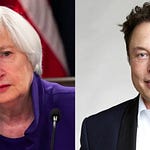Former FED chairwoman and current Secretary of the Treasury Janet Yellen recently argued against overturning the 1973 Roe v. Wade Supreme Court decision legalizing abortion, arguing that it would harm the economy. She correctly noted that it costs money to raise a child. Missing in her testimony however, was the value created by another human life. Costs must be measured against benefits. Before talking about the costs of overturning Roe, we need to talk about the cost of Roe itself.
The Guttmacher Institute and others have estimated that 63 million abortions have occurred since the 1973 decision.
Economists note the positive relationship between population growth and GDP per capita growth. This makes sense when you consider that the source of our wealth is ideas and only people have ideas. More free people equal more ideas, and more ideas mean more wealth.
From 1972 to 2021 U.S. population increased by 123 million from 209 million to 332 million. During this same period real GDP per capita increased by $38,861 from $30,360 to $69,221. For every additional million people, real GDP per capita increased by $316 ($38,861 ÷ 123). A regression on these two variables indicates a value of $310 per million with a coefficient of determination of 0.98.
How can we measure the economic benefits of 63 million more Americans? One way would be to look at the relationship between growth in population and growth in GDP per capita. Adding these 63 million missing persons over the last 49 years and adding the higher growth, would put 2021 GDP per capita almost $20,000 higher at $89,125 instead of $69,221 ($316 x 63). That was just the loss in 2021. Take a look at the accumulated GDP per capita lost over the last 49 years (the green area). It amounts to $543,276 per capita.
Another important consideration is total GDP. If GDP per capita was $20,000 higher and we had 63 million more people, our total GDP in 2021 would be $35.2 trillion, over $12 trillion (52 percent) higher that our actual GDP of $23 trillion. This is just in 2021. The green area represents the accumulated GDP lost over the last 49 years. This area is $279 trillion.
Elon Musk, the world’s richest man, clearly recognizes the value of human life. He recently declared in a Wall Street Journal interview:
There are not enough people. I can’t emphasize this enough. There are not enough people. And I think one of the biggest risks to civilization is the low birthrate and the rapidly declining birthrate. And yet so many people, including smart people, think that there are too many people in the world and think that the population is growing out of control. It’s completely the opposite. Please look at the numbers. If people don’t have more children, civilization is going to crumble. Mark my words.
He followed this up with a tweet on Japan, “At the risk of stating the obvious, unless something changes to cause the birthrate to exceed the death rate, Japan will eventually cease to exist. This would be a great loss for the world.”
The New York Times reports one million deaths in the U.S. due to COVID. The estimated costs to GDP of these lost lives has been in the trillions. Imagine COVID descending upon us in 1973 and causing an average of 1.28 million deaths per year. Also, these aren’t deaths of 80-year olds, these are deaths of infants. COVID has been deadly and costly, but nothing close to the harm of Roe v. Wade.
This analysis represents a simple way to estimate the costs. Others would consider additional variables, but the fundamental estimate suggests that Roe has been tremendously costly for America.
You can learn more about these economic facts and ideas in our forthcoming book, Superabundance, available for pre-order at Amazon. George Gilder calls it a “supremely contrarian book” which overturns “the tables in the temple of conventional thinking” by deploying “rigorous and original data and analysis to proclaim a gospel of abundance. Economics—and ultimately, politics—will be enduringly transformed.”
Gale Pooley is a Senior Fellow at the Discovery Institute and a board member at Human Progress.
Please share this valuable essay with your friends.


















Share this post